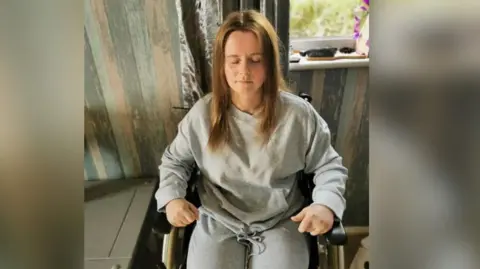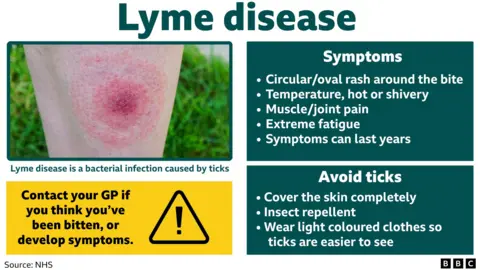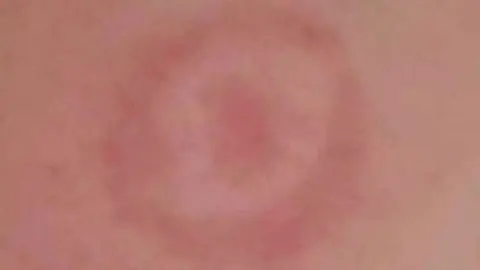'I need Botox to see after a tick bite left me unable to move'
 Melonie Bray
Melonie BrayMelonie Bray had been an active person, usually found in the mountains and spending time with her young daughter.
But one tick bite turned her entire world upside down as she caught Lyme disease, a bacterial infection passed to humans by the parasites.
As a result, Ms Bray, 32, from Bangor, Gwynedd, was unable to control her body, talk or open her eyes. She now needs Botox injections to see.
She said she wants to get her life back, but the treatments are only available privately and cost thousands of pounds.
Ms Bray had been a climbing instructor, and was training to become a mountain leader.
Before the tick bite, she would take her daughter to school, then go into the mountains to hike, or go to work. In the afternoons, she would pick up her daughter, make dinner, take her to clubs and get her ready for bed.
Ms Bray said: "I was busy all the time, people used to say I needed to sit down."
Now her days look "completely different".
"I wake up in the morning and most of the time I am so stiff I can't even get out of bed."
She said she has a commode in the living room because she cannot go upstairs to the bathroom.
She uses an electric wheelchair to get around the house but has to have help to leave the property as there is a step outside.
"If I want a shower I have to go to my mum's house, or Ricky will do it in the kitchen which is not very good in a chair."
She said her partner Ricky Thomas, 41, "literally does everything" now and gave up his job as a stone mason to become her full-time carer.
 Melonie Bray
Melonie BrayIt all began in July 2022 when Ms Bray noticed a bullseye rash develop on her arm.
Doctors gave her steroid cream but this made the rash worse.
She noticed her eye twitching, but did not think anything of it.
"I carried on working, everything was fine, then I started getting back pain, then on 5 January 2023 my hands started twinging while I was driving home from work.
"The next morning when I woke up, my hands were pulled into a fist, I couldn't open them."
Over the next few months she and her partner desperately tried to figure out what was happening.
Doctors initially diagnosed her with Crest Syndrome, a rare autoimmune condition, but this was later discounted.
"Two months later my eyes got worse, I developed blepharospasm, which is twitching of the eyelids to the point they closed.
"That week my eyes, my legs, everything went. I couldn't even sit up, I couldn't see, or talk - I was a plank."
Ms Bray was diagnosed with Functional neurological disorder (FND) but there is no cure and physiotherapy did not help.

It was not until August that Ms Bray remembered her bullseye rash and realised the possible link.
They bought a home diagnostic kit for Lyme disease, which came back positive.
The disease can be difficult to diagnose. It has similar symptoms to other conditions and does not always cause an obvious rash, according to the NHS.
She was clinically diagnosed with Lyme disease when she travelled to Ireland to consult a Lyme disease specialist and started treatment.
"I went back and forth to Ireland twice, but obviously it's expensive to go all the time when you can't work, so I had to stop going - and my symptoms started returning."
 Melonie Bray
Melonie BrayMs Bray was taken to hospital again and put on IV antibiotics, but was only able to have four cycles due to strict guidelines.
"Every time they stopped it, I kept going backwards. I was seeing small improvements, I was stronger, my eyes weren't contracting anymore, I could see, sit up unaided."
Mr Thomas said: "It's been mad, for her to get bitten from something small like that and to go from an active person doing three jobs a day to nothing is another shock as well.
He said "seeing her in so much pain" had been really hard for him.
Ms Bray can still open her eyes because of Botox injections, but her body control is deteriorating continuously, she said.
 Melonie Bray
Melonie BrayMs Bray is now stuck in limbo, unable to access treatment unless she goes private.
To work towards this, a GoFundMe page has been set up by Medicine Fundraising Events.
"It's given me hope, the chance to get better and get my life back," the 32-year-old said.
Currently they are aiming for one year's worth of Ozone therapy costing £7,000.
The treatment is under-researched, but has generated a lot of interest from people living with Lyme disease.
However this is a treatment Ms Bray would need forever.
Alternatively she could travel to Germany for "proper treatment, including antibiotics and immune therapy" for two weeks which would cost £18,000.
She said: "If you are bitten by a tick and develop a bullseye rash, make sure to get antibiotics at an early stage because if you don't it gets much more complicated."
She added "the guidelines need to be changed" when it comes to treatment.
"They say four weeks is enough - it may be for people treated in the early days of being bitten but not for people who go on to be chronic."
The NHS follows guidelines from NICE, which has been contacted for comment.
If Ms Bray recovers, she said she hopes to one day climb Yr Wyddfa, also known as Snowdon, again with her daughter and "do the things I'd planned to do".
"Obviously I'd be happy if I got 50% better," she said.
